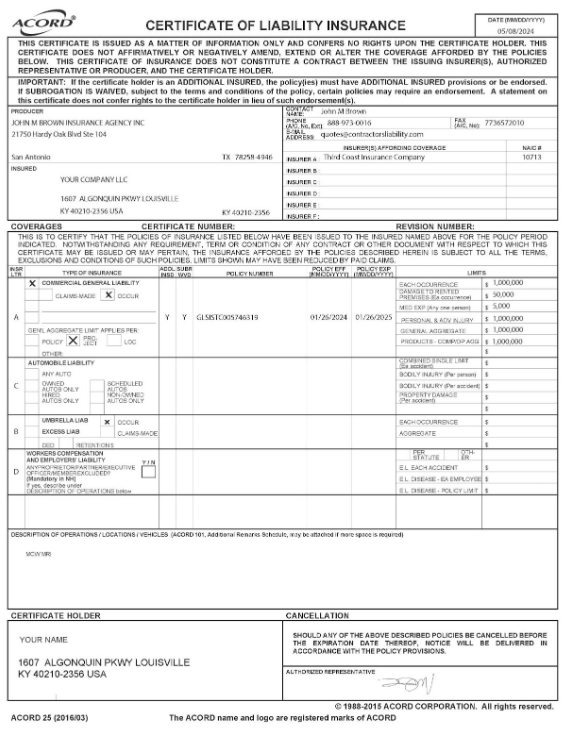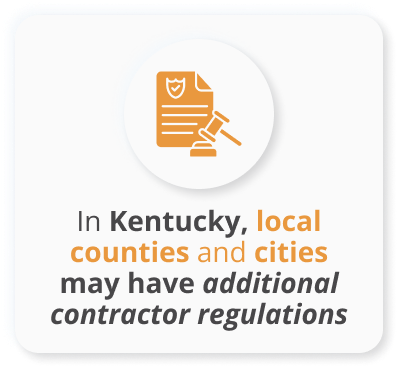Whether you’re a general contractor, electrician, plumber, or roofer, obtaining the appropriate contractor’s license in Kentucky is essential for legally operating your contracting business. Here’s a high-level overview of the key requirements you need to meet in the Bluegrass State.
1. License Classifications
- General Contractors: In Kentucky, general contractors may not need a state-level license, but many local jurisdictions require one. Obtaining a contractor license is crucial for ensuring compliance with local regulations. Check with your local city or county office, such as the Lexington-Fayette Urban County Government or the Louisville Metro Department of Codes & Regulations, for specific requirements.
- Electricians: The Kentucky Department of Housing, Buildings, and Construction (HBC) issues electrical licenses. Both Master Electricians and Journeyman Electricians must pass a state exam administered by the HBC.
- Plumbers: Plumbing contractors must be licensed by the HBC. Kentucky requires you to have a Journeyman Plumber’s license before you can become a Master Plumber. The HBC oversees the licensing process for plumbers as well.
- Roofers: Similar to general contractors, roofing contractors may need to obtain licenses at the local level, depending on the municipality. Roofing contractors must ensure they have the appropriate contractor’s license to operate legally in their municipality. Consult local government offices like the Bowling Green Planning and Zoning or the Covington Building & Inspections Department for details.
2. General Requirements
- Age: You must be at least 18 years old.
- Experience: Proof of relevant work experience or completion of an apprenticeship program is often required, especially for electricians and plumbers.
- Examination: Most trades require passing a state or local licensing exam. For electricians and plumbers, exams are administered by the Kentucky Department of Housing, Buildings, and Construction.
- Insurance: Proof of general liability insurance is often required. Specific amounts may vary based on local regulations. You may need to check with the Kentucky Office of Insurance or local government offices for details.

- Fees: Licensing fees vary by trade and location. Expect to pay application, exam, and renewal fees. Information on specific fees can usually be obtained from the respective local government offices or the HBC.
- Federal Employer Identification Number: Contractors must obtain a Federal Employer Identification Number (FEIN) as part of the business registration process, especially if they plan to hire employees.
3. Application Process
- Submit Application: Applications can typically be submitted online through the Kentucky Department of Housing, Buildings, and Construction’s website or via mail, depending on the specific trade and local requirements.
- Provide Documentation: You’ll need to provide proof of experience, exam results, insurance, and any other required documents. You may also need to provide an Occupational License Number obtained from the local revenue commission as part of your application.
- Await Approval After submitting your application, there may be a waiting period for approval. Once approved, you’ll receive your contractor’s license.
4. Maintaining Your License
- Renewal: Most contractor licenses in Kentucky must be renewed annually. Contractors holding licenses that allow for multiple permits, such as Building Type A, must ensure they renew their licenses annually to maintain their ability to obtain these permits. Be sure to keep track of renewal dates to avoid penalties. The Kentucky Department of Housing, Buildings, and Construction usually provides renewal guidelines.
- Continuing Education: Certain trades, such as electricians, may require continuing education credits to renew your license. These requirements are often detailed by the HBC or relevant local authorities.
5. Local Jurisdictional Differences
Overview of Local Regulations
While Kentucky has overarching state-level regulations for contractors, it’s crucial to understand that many counties and cities have their own specific requirements that go beyond what the state mandates. These local regulations can include additional licensing requirements, stricter safety standards, and even different insurance coverage levels.

Louisville and Lexington are prime examples of cities in Kentucky where local regulations play a significant role:
- Louisville: As Kentucky’s largest city, Louisville has stricter building codes and safety inspections due to its size and economic significance. Contractors may face additional requirements like specific permits, higher insurance limits, and thorough background checks, enforced by the Louisville Metro Department of Codes & Regulations to ensure safety and quality. Specialty contractors, such as HVAC and plumbing specialists, may face additional requirements like specific permits and higher insurance limits.
- Lexington: Lexington, the state’s second-largest city, has its own set of local regulations, especially in zoning and building codes, managed by the Lexington-Fayette Urban County Government. Contractors may need to navigate different fees, inspections, and additional local permits to comply with these regulations.
Key Local Contacts
Navigating local regulations can be challenging, so it’s essential to know where to seek help. Specialty contractors should also reach out to these local offices to ensure they meet all necessary requirements for their specific trade. Below are key contacts in some of Kentucky’s major cities:
- Louisville Metro Department of Codes & Regulations:
Website: https://louisvilleky.gov/government/codes-regulations
Phone: (502) 574-2508
Address: 444 S. 5th Street, Louisville, KY 40202
- Lexington-Fayette Urban County Government, Division of Building Inspection:
Website: https://www.lexingtonky.gov/departments/building-inspection
Phone: (859) 258-3770
Address: 101 E. Vine Street, Lexington, KY 40507
- Bowling Green Planning and Zoning:
Website: https://www.bgky.org/finance/license
Phone: (270) 393-3000
Address: 1017 College Street, Bowling Green, KY 42101
- Covington Building & Inspections Department:
Website: https://thecovky.gov/permits/
Phone: (859) 292-2122
Address: 20 W. Pike Street, Covington, KY 41011
By contacting these local offices, contractors can ensure they meet all necessary requirements and avoid common pitfalls associated with local regulations. This proactive approach is essential for successfully navigating Kentucky’s varied regulatory landscape.
Obtaining the proper contractor’s license is just the beginning. To protect your business, make sure you have the right insurance coverage. In addition to general liability insurance, make sure you have workers compensation insurance to protect your employees and comply with state regulations. Visit ContractorsLiability.com to explore your options and get a quote today.
Frequently Asked Questions (FAQ)
These are common questions about General Contractor License in Kentucky.
You need proof of work experience, pass relevant exams, secure liability insurance, and obtain a surety bond. Requirements vary by license type.
Yes, Kentucky requires specialty licenses for trades like electrical, plumbing, and HVAC, with additional exams and qualifications.
Yes, cities like Louisville and Lexington may have stricter building codes and require additional permits or inspections.
Renew your license every 1-2 years by completing continuing education, maintaining insurance and bonds, and paying renewal fees.
You need general liability insurance and, if you have employees, workers’ compensation. A surety bond may also be required.

